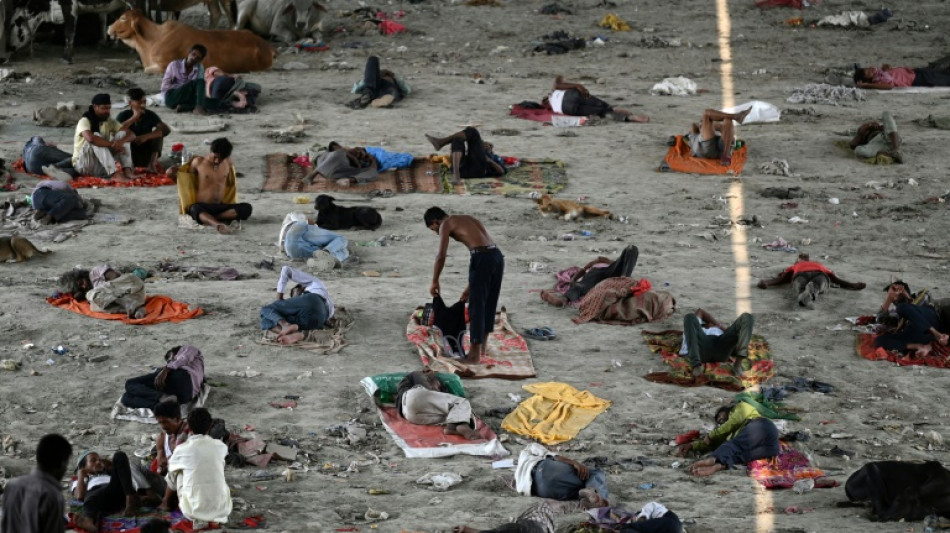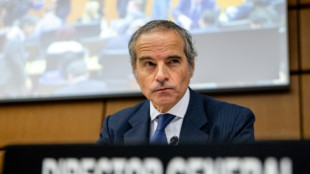
-
 Kremlin says agreed to halt strikes on Kyiv until Sunday
Kremlin says agreed to halt strikes on Kyiv until Sunday
-
Carrick calls for calm after flying start to Man Utd reign

-
 Djokovic to meet Alcaraz in Melbourne final after five-set marathon
Djokovic to meet Alcaraz in Melbourne final after five-set marathon
-
Italian officials to testify in trial over deadly migrant shipwreck

-
 Iran says defence capabilities 'never' up for negotiation
Iran says defence capabilities 'never' up for negotiation
-
UN appeals for more support for flood-hit Mozambicans

-
 Lijnders urges Man City to pile pressure on Arsenal in title race
Lijnders urges Man City to pile pressure on Arsenal in title race
-
Fulham sign Man City winger Oscar Bobb

-
 Strasbourg's Argentine striker Panichelli sets sights on PSG, World Cup
Strasbourg's Argentine striker Panichelli sets sights on PSG, World Cup
-
Jesus 'made love': Colombian president irks Christians with steamy claim

-
 IAEA board meets over Ukraine nuclear safety concerns
IAEA board meets over Ukraine nuclear safety concerns
-
Eurozone growth beats 2025 forecasts despite Trump woes

-
 Dutch PM-elect Jetten says not yet time to talk to Putin
Dutch PM-elect Jetten says not yet time to talk to Putin
-
Social media fuels surge in UK men seeking testosterone jabs

-
 Forest face Fenerbahce, Celtic draw Stuttgart in Europa League play-offs
Forest face Fenerbahce, Celtic draw Stuttgart in Europa League play-offs
-
US speed queen Vonn crashes at Crans-Montana, one week before Olympics

-
 Trump nominates former US Fed official as next central bank chief
Trump nominates former US Fed official as next central bank chief
-
New Dutch government pledges ongoing Ukraine support

-
 Newcastle still coping with fallout from Isak exit, says Howe
Newcastle still coping with fallout from Isak exit, says Howe
-
Chad, France eye economic cooperation as they reset strained ties

-
 Real Madrid to play Benfica, PSG face Monaco in Champions League play-offs
Real Madrid to play Benfica, PSG face Monaco in Champions League play-offs
-
Everton winger Grealish set to miss rest of season in World Cup blow

-
 Trump brands Minneapolis nurse killed by federal agents an 'agitator'
Trump brands Minneapolis nurse killed by federal agents an 'agitator'
-
Arteta focuses on the positives despite Arsenal stumble

-
 Fijian Drua sign France international back Vakatawa
Fijian Drua sign France international back Vakatawa
-
Kevin Warsh, a former Fed 'hawk' now in tune with Trump

-
 Zverev rails at Alcaraz timeout in 'one of the best battles ever'
Zverev rails at Alcaraz timeout in 'one of the best battles ever'
-
Turkey leads Iran diplomatic push as Trump softens strike threat

-
 Zelensky backs energy ceasefire, Russia bombs Ukraine despite Trump intervention
Zelensky backs energy ceasefire, Russia bombs Ukraine despite Trump intervention
-
'Superman' Li Ka-shing, Hong Kong billionaire behind Panama ports deal

-
 Skiing great Lindsey Vonn crashes at Crans-Montana, one week before Olympics
Skiing great Lindsey Vonn crashes at Crans-Montana, one week before Olympics
-
Slot warns Liverpool 'can't afford mistakes' in top-four scrap

-
 Paris show by late Martin Parr views his photos through political lens
Paris show by late Martin Parr views his photos through political lens
-
Artist chains up thrashing robot dog to expose AI fears

-
 Alcaraz outlasts Zverev in epic to reach maiden Australian Open final
Alcaraz outlasts Zverev in epic to reach maiden Australian Open final
-
French PM forces final budget through parliament

-
 French-Nigerian artists team up to craft future hits
French-Nigerian artists team up to craft future hits
-
Dutch watchdog launches Roblox probe over 'risks to children'

-
 Trump brands Minneapolis nurse shot dead by federal agents an 'agitator'
Trump brands Minneapolis nurse shot dead by federal agents an 'agitator'
-
Israel says killed 'three terrorists' in Gaza

-
 After Trump-fueled brawls, Canada-US renew Olympic hockey rivalry
After Trump-fueled brawls, Canada-US renew Olympic hockey rivalry
-
Eileen Gu - Olympic champion who bestrides rivals US, China

-
 Trump, first lady attend premier of multimillion-dollar 'Melania' documentary
Trump, first lady attend premier of multimillion-dollar 'Melania' documentary
-
US Senate eyes funding deal vote as government shutdown looms

-
 Cuddly Olympics mascot facing life or death struggle in the wild
Cuddly Olympics mascot facing life or death struggle in the wild
-
UK schoolgirl game character Amelia co-opted by far-right

-
 Anger as bid to ramp up Malaysia's football fortunes backfires
Anger as bid to ramp up Malaysia's football fortunes backfires
-
Panama court annuls Hong Kong firm's canal port concession

-
 Pioneer African Olympic skier returns to Sarajevo slopes for documentary
Pioneer African Olympic skier returns to Sarajevo slopes for documentary
-
Trump threatens tariffs on nations selling oil to Cuba

| VOD | -0.17% | 14.685 | $ | |
| RYCEF | -2.69% | 16 | $ | |
| RELX | -0.81% | 35.875 | $ | |
| CMSC | -0.21% | 23.645 | $ | |
| BTI | -0.13% | 60.13 | $ | |
| NGG | -0.1% | 84.965 | $ | |
| RIO | -2.64% | 92.68 | $ | |
| AZN | 0.39% | 92.95 | $ | |
| GSK | 1.21% | 51.275 | $ | |
| RBGPF | 1.65% | 83.78 | $ | |
| CMSD | 0.17% | 24.1 | $ | |
| JRI | 0.27% | 12.99 | $ | |
| BP | 0.42% | 38.2 | $ | |
| SCS | 0.12% | 16.14 | $ | |
| BCC | -1.57% | 78.93 | $ | |
| BCE | 0.14% | 25.52 | $ |

Heat records topple across sweltering Asia
Temperature records are being toppled across Asia, from India's summer to Australia's winter, authorities said Friday, in fresh evidence of the impact of climate change.
The sweltering temperatures match longstanding warnings from climate scientists and come as countries from Greece to Canada battle record heat and deadly wildfires.
In India, the world's most populous country, officials said this August was the hottest and driest since national records began more than a century ago.
The month falls in the middle of India's annual monsoon, which usually brings up to 80 percent of the country's yearly rainfall.
But despite heavy downpours that caused deadly floods in the country's north earlier this month, overall rainfall has been far below average.
August saw an average of just 161.7 millimetres (6.4 inches), 30.1 mm lower than the previous August record in 2005, the India Meteorological Department (IMD) said.
That has left the country baking in unrelenting heat.
"The large rainfall deficiency and weak monsoon condition is the main reason," the IMD said.
Authorities in Japan also said Friday that the country had experienced its hottest summer since records began in 1898.
Temperatures from June to August were "considerably higher" than average across the north, east and west of the country, the weather agency said.
In many locations "not only maximum temperatures but also minimum temperatures" reached record highs, it added.
And in Australia this winter was the warmest on record, with an average temperature of 16.75 degrees Celsius (62.15 Fahrenheit) for the season running from June to August.
That is a hair above a record set in 1996, and the highest average winter temperature since the country's records began in 1910, the Bureau of Meteorology said.
- 'More intense, more frequent' -
Climate change has fuelled searing temperatures across the globe already this year, with July the hottest month ever recorded on Earth.
Scientists have long warned that climate change produces heatwaves that are hotter, longer and more frequent.
And the warming El Nino weather pattern could turbocharge the heat further, though its effects are likely to become more apparent later in the year as it strengthens.
Heatwaves are among the deadliest natural hazards, with hundreds of thousands of people dying from preventable heat-related causes each year.
In developed countries, adaptations including air conditioning can help mitigate the impact.
But even in wealthy Japan, authorities said at least 53 people died of heatstroke in July, with almost 50,000 needing emergency medical attention.
The effects of heat are unevenly distributed, with small children and the elderly less able to regulate their body temperatures and thus more vulnerable.
Those who have to work outside are also particularly at risk.
Even a healthy young person will die after enduring six hours of 35-degree-Celsius (95 Fahrenheit) warmth coupled with 100 percent humidity.
But extreme heat does not need to be anywhere near that level to kill people, experts warn.
John Nairn, a senior extreme heat adviser at the UN's World Meteorological Organization (WMO), said last month that heatwaves are "becoming much more dangerous".
"It's the most rapidly emerging consequence of global warming that we are seeing," he told AFP in an interview.
"People are far too relaxed about the signs," he lamented.
"It will only get more intense and more frequent."
burs-sah/leg
C.Kovalenko--BTB



